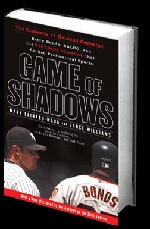
Following the explosive impact from Game of Shadows -- Mark Fainaru-Wada's and Lance Williams's investigative book documenting the San Francisco area BALCO steroid scandal -- Major League Baseball (MLB) Commissioner Bud Selig assigned former US Senator, and current Red Sox "partner" George Mitchell to direct a blue panel investigation of performance enhancing drugs (PEDs) in MLB. The resulting Mitchell Report will be released on Thursday.
The commission convened not a moment too soon. Earlier, Jose Canseco's inject-and-tell book Juiced blueprinted how a skinny kid can pharmacologically enhance himself to a 40 home run, 40 stolen base, blue-eyed handsome man. Game of Shadows subsequently looked into the use of PEDs by some of MLB's most stellar stars. Baseball seemingly had morphed into a 'steroid era' where a steroid-using Canseco openly called for the use of PEDs to enhance the game, and where experts questioned if baseball's most venerated records needed asterisking.
The Mitchell Report will likely consist of:
1. Definition of the problem: use ( perhaps widespread) of PEDs in baseball
2. Delineation of the breadth of the PED problem; will include names of doping ball players (?50) and the means of obtaining illegal anabolic drugs
3. Prescriptions for significant change in the MLB culture: education about the risks of PEDs, monitoring and deterrence of PED use, reconciliation between the various interests about the methodology and goals of anti-doping programs
Pundits suggest the Mitchell Report will discuss the development of baseball's PED problem, and the response of the ownership of baseball to the steroid crisis. The complex balance between baseball management (the owners) and baseball labor (the players) does not exist in the Olympic sports -- which allow WADA to call the anti-doping shots. In American professional sports the tension between the parties prevents implementation of many of the anti-doping measures developed in Olympic sports. For example, the MLB was slow to adopt a prohibited list of anabolic drugs, although policies banning PEDs in principle existed as far back as 1991.
Mitchell will discuss the various PEDs, and how players spread the juice from team to team. The report should mention the distribution channels and the unethical dealers, trainers, and doctors standing behind the drug-cheating players. A major source for Mitchell appears to be Kirk Radomski, the Met clubhouse attendant turned steroid dealer to the stars. As part of a plea bargain, Radomski agreed to tell all to the Mitchell investigatory panel.
Certain players most assuredly will be enumerated on the lineup card: Barry Bonds, Raffy Palmeiro, Mark McGwire and possible Sammy Sosa garner starring roles. There will be supporting roles for Internet pharmacy juicers like Jose Guillen, Troy Glaus, and Gary Matthews Jr. Most likely, a surprise name or two will hook slide into the report.
Defining the problems illegal widespread PED use generated for baseball, will be predictable. Anyone paying attention the past several years to steroid stories in the local sports pages, to Sports Illustrated or ESPN special reports on PEDs, or to the San Francisco Chronicle's investigative pieces on the developing steroid-dealing BALCO scandal, can outline a general history of steroid use in baseball. Most fans can complete a rudimentary 'Who's Who' of diamond juicers. Nonetheless, the remedy for the PED malady will be more important than names and dates.
Juiced players names will hit the headlines, as discussions will revolve around enlarged biceps, increased skull circumferences, milestone-record asterisks, the high monetary stakes involved in player performance, and Hall of Fame eligibility for dopers. A few players may receive a slap on the syringe. However, monitoring, deterrence, and culture change should be the defining and lasting legacy from Mitchell's effort. This complex challenge -- how to implement changes in a corrupt culture -- should determine whether the Mitchell Report simply recounts history, or whether the effort initiates a major paradigm change in the drug-cheating MLB culture.
Read more news and blog posts on the Mitchell report on steroids in baseball here.